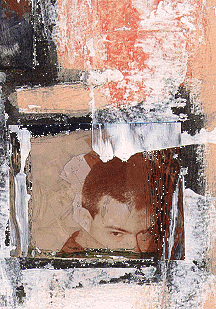 "A human being who should dream his life
"A human being who should dream his life
Story and image by Roy Parkhurst
In the ontology of memory, are the souvenirs of our past given a different cast if they are events or dreams? I remember feeling the strong sensation of abandonment upon stepping from a train onto a platform in a totally unfamiliar space.
I am a young man, but I feel much younger. In this memory, I am traveling in Japan with my mother. I speak no Japanese. I follow around and attend to my mother at all times. I get the desire to go to Tokyo to shop in the Shinjuku, but my mother really does not want to go. She tells me to go by myself. I am staying in a town outside of Tokyo in my Grandmother's home. This town is crowded with business and houses, clearly a bit of the outskirts of Tokyo. It's a long walk from my Grandmother's house to the train station, but it all passes through tight streets of bustling activity, landmarks I have begun to memorize. I have walked this path many times with my mother over the past few days and think that I can find my way without too much trouble, even at night. I prepare a careful itinerary of the train trip.
I go to Tokyo and do my business. Everything goes well. I am very careful to look at every station name as I pass, noting on a checklist all the different locations, their order, and when to change trains. In deep concentration, I find that it's very easy to get around. I find what I'm looking for. I come home late in the day. Perhaps I am overly confident from the good fortune of the earlier part of the day. Perhaps I make some errors in timing, missing the train I'm expecting, but I figure out when the next train on this line is going my way and feel that it simply puts me behind a bit. Perhaps the new train doesn't stop at as many stations; perhaps it is some sort of express. On the way home I lose track of the stations somehow. Perhaps the express throws me, perhaps I doze off. I don't know. I count the stations.
Finally I reach a station that I think is close to the correct number of stops as I try and reconstruct it in my mind. But when I look out it is totally unrecognizable. I am horrified and step out onto the station platform with the intention of going back the way I came since I have obviously gotten terribly confused. I see that I am in this wide open space, the platform raised up above wide-stretching fields. There are no people and there is nothing for miles around this platform. The train pulls away and I think that I must have gone too far and must catch another train back the other way, yet I have no sense of how I can find out. This station platform in the middle of a plain seems strangely surreal to me.
Eventually I find my way back toward Tokyo on a train going the other way and easily find the town I am seeking. Everything goes perfectly well after this and my moment of panic on the platform is totally dissipated. I elect to tell no one because I am both embarrassed and do not want to upset my mother who worries a great deal about everything.
This memory which could be a dream, but which seems to me as real as any moment of panic I have ever experienced, is deep in the recesses of my mind. But the feeling of abandonment I now feel is different. I now long to find that lost station again, to stand out on that platform and immerse myself in the solitude of a familiar place.

